Photo by Caleb Woods on Unsplash
Becoming a cabin crew member is an exciting and fulfilling career, but it takes thorough training to meet the industry’s high standards. Training programs teach essential skills, from safety procedures and emergency response to customer care and teamwork. Trainees practice handling real-life situations, building the confidence to manage pressure and succeed. By the end of the training, participants not only understand their responsibilities but also develop the professionalism and adaptability that airlines value. This foundational preparation ensures that aspiring cabin crew members are ready to excel in the fast-paced world of aviation.
Learning Safety and Emergency Procedures
Safety is the cornerstone of any cabin crew training program, and a significant portion of the curriculum is dedicated to mastering emergency procedures. Trainees learn how to respond to various in-flight emergencies, such as fires, medical incidents, or evacuation scenarios. This includes practical training with safety tools like oxygen masks, fire extinguishers, and evacuation slides. Realistic simulations allow participants to practice these skills, ensuring they can react quickly and efficiently when needed. The focus on safety builds a strong sense of responsibility and preparedness, which is critical for maintaining passenger trust. By emphasizing these procedures, training programs help future crew members develop the confidence to manage challenging situations calmly.
Mastering Customer Service Excellence
Providing excellent customer service is another key component of cabin crew training programs. Trainees are taught how to address passenger needs while maintaining a friendly and professional demeanor. This involves learning how to communicate effectively, resolve conflicts, and ensure that passengers feel comfortable and valued. The training also covers cultural sensitivity, helping crew members cater to diverse groups of travelers with respect and understanding. Practical exercises, such as role-playing scenarios, help trainees refine their interpersonal skills. These lessons help improve passenger experience and strengthen the airline’s reputation. Customer service training prepares cabin crew members to deliver exceptional hospitality throughout their careers.
Building Teamwork and Collaboration Skills
A successful flight relies on seamless teamwork, and cabin crew training programs emphasize the importance of collaboration. Trainees learn how to coordinate with their colleagues and the flight deck to ensure smooth operations. This includes practicing clear and concise communication during both routine tasks and emergencies. Training programs also foster trust and cooperation, as crew members must rely on each other in high-stakes situations. Exercises designed to simulate real-world challenges encourage participants to work together effectively. Teamwork is essential to keeping every flight safe and running smoothly. By instilling these values, training programs prepare trainees for the collaborative nature of their future roles.
Developing Problem-Solving and Adaptability
Cabin crew members often face unexpected challenges, from flight delays to demanding passengers, and training programs help them develop the problem-solving skills needed to adapt. Trainees are taught how to assess situations quickly, consider their options, and make sound decisions under pressure. This involves learning how to balance company policies with the needs of passengers, finding solutions that work for everyone. Flexibility is essential since crew members need to adapt to changing schedules, routes, and conditions during flights. Scenario-based training allows participants to practice handling unpredictable situations in a controlled environment. These skills are crucial for maintaining professionalism and ensuring smooth operations, no matter the circumstances.
Preparing for the Realities of the Job
In addition to technical skills, cabin crew training programs prepare participants for the practical realities of working in aviation. This includes understanding the physical demands of the job, such as long hours on their feet and adjusting to different time zones. Trainees learn how to care for themselves to perform at their best. They also gain insights into the industry’s structure and expectations, helping them transition into their roles with confidence. Familiarity with airline procedures and standards ensures that new crew members are ready to meet the challenges of their first flights. By addressing these aspects, training programs provide a holistic preparation for life as a cabin crew member.
Cabin crew training programs are essential for preparing individuals to succeed in the competitive and fast-paced aviation industry. These programs teach safety, customer service, teamwork, and adaptability to help trainees succeed in their careers. Hands-on exercises and real-world practice help them build confidence and handle different challenges. With a strong focus on professionalism, graduates are prepared to meet the job’s demands. For aspiring cabin crew members, these training programs offer more than technical knowledge—they provide the tools to thrive in a dynamic and exciting field. With the right preparation, a career in aviation becomes an opportunity to grow and excel.

Daniel J. Morgan is the founder of Invidiata Magazine, a premier publication showcasing luxury living, arts, and culture. With a passion for excellence, Daniel has established the magazine as a beacon of sophistication and refinement, captivating discerning audiences worldwide.





